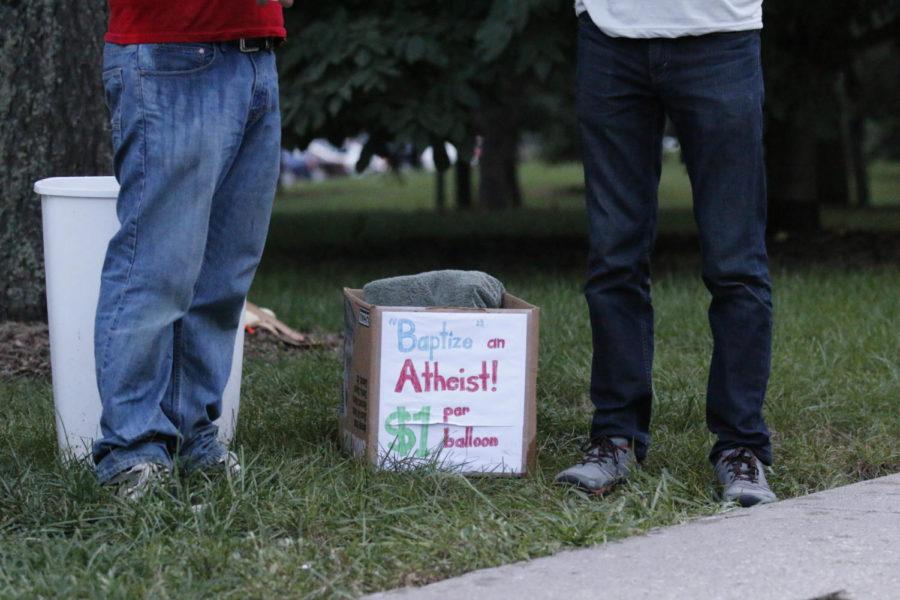Beiwel: Christians, atheists both responsible for forcing beliefs
Richard Martinez/Iowa State Daily
As part of the Atheist and Agnostic Society’s fundraiser, “Bless an atheist,” participants could purchase a water balloon to throw at a society member. The organization set up in front of The Salt Company’s kickoff event on the south Campanile lawn.
April 27, 2016
A 2014 survey found that 7 percent of American adults consider themselves to be either atheist or agnostic, a number that was significantly higher than a study completed seven years earlier. Atheists and agnostics tend to be about 34 years old, white and male.
This is surprising since religion has always been very prevalent in the United States. The fact that we don’t claim an official national religion allows the diversity of beliefs and culture that makes the United States the land of the free — or at least tries to. Whether it’s succeeding is up for argument, but the attempt is generally there.
However, atheism is the lack of belief. Or in the words of the American Atheists, “Atheism is not a belief system nor is it a religion … atheists do not have a common belief system, sacred scripture or atheist pope.” Being an atheist is not one solid thing; you don’t just sit down in a room of atheists and expect them to all agree with one another. Much like there are conflicting sects in Christianity there are opposing views in atheism.
In fact, atheists are so varied and complex that people are often surprised to know that someone they know is an atheist. I have noticed a vastly different reaction when someone is invited to church and he or she either says, “No, that’s not really my thing” or “No, I’m an atheist.”
People are more willing to accept a lapsed Christian, I believe, than an atheist. They appreciate the wishy-washy belief more than the willful rejection. To some Christians, the disregard for God is a cause for anger, and that anger can swell into fury.
And honestly, many atheists are hateful in return. Atheism in pop culture is oftentimes associated with a smug, fedora-wearing teenager smirking and saying things like “how’s your imaginary friend?”
It’s sometimes hard to believe, but the anger and misinformation that comes from the more militant Christians is directly echoed by the more militant atheists.
One site I found prompts atheists to ask Christians, “What is it like to literally believe in magical incantations like ‘amen’ or ‘in the name of Jesus?'” They say to sow the seeds of doubt in Christians’ minds, and another post claims that the ridicule of religion is a tool like any other.
First, I don’t think most atheists are like this. In fact, the vast majority are respectful and interesting, and can debate without turning it into a game of ‘who can be the bigger jerk?’ However, those who do and are largely part of the New Atheism movement, baffle me. Why does it bother people so much to have others disagree with them?
I know Christianity has a shady history and that many Christian beliefs can be skewed to promote hate and discrimination. I also know churches aren’t taxed, but what is so wrong with believing in the core elements of faith?
The critique of religion is not the same as the outright disrespectful vitriol that spews from frustration with a huge and near unchangeable system. I understand why religious people, particularly Christians, try to convert nonbelievers. For some, it comes from a place of good intentions. They’re trying to help.
I also understand why atheists try to spread atheism. They want to see a more rational world that is free from beliefs they find lacking. They, too, are trying to help.
But the loud, insulting remarks from both sides come from the same place as well. You can’t be angry with someone for trying to force their beliefs on you, and then turn around and try to forcefully bring others to your way of thinking. No matter what your motivation is, you’re just being the other side of their coin.
I’m not advocating for either side. My belief or non belief in anything shouldn’t be important. But I do think militant atheists and militant believers are destructive and damaging to the more moderate people in their camp.

















